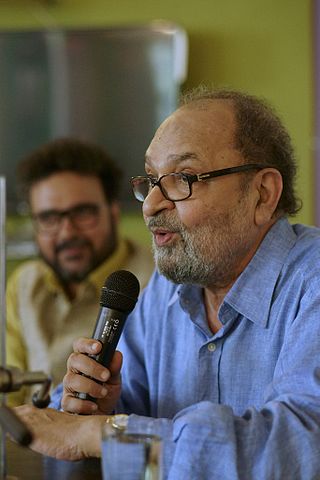Top Qs
Timeline
Chat
Perspective
Saeed Naqvi
Indian journalist From Wikipedia, the free encyclopedia
Remove ads
Saeed Naqvi is senior Indian journalist, television commentator, interviewer. He has interviewed world leaders and personalities in India and abroad, which appear in newspapers, magazines and on national television, remained editor of the World Report, a syndication service on foreign affairs, and has written for several publication, both global and Indian, including the BBC News, The Sunday Observer, The Sunday Times, The Guardian, Washington Post, The Indian Express, The Citizen and Outlook magazine. At the Indian Express, he started in 1977 as a Special Correspondent and eventually becoming, editor, Indian Express, Madras, (1979–1984), and Foreign Editor, The Indian Express, Delhi in 1984, and continues to writes columns and features for the paper.[3][4][5]
Remove ads
Career
Summarize
Perspective
Saeed Naqvi started his journalist career as Staff Reporter with The Statesman, Delhi in 1964, later he became editor of the Sunday Magazine. During this period, in spring of '68, when The Beatles visited India, he along with fellow photographer, Raghu Rai filed new reports and photographs for newspapers.[6][7] He stayed in the Maharishi Mahesh Yogi's ashram as a disciple to capture the story of The Beatles stay in Ashram, Rishikesh, Himalaya. He reported from the inside about the life and living of John Lennon, George Harrison, Paul McCartney and Ringo Starr.[8]
As editor and producer, of WORLD REPORT, a weekly foreign affairs show on Doordarshan (the national network) called Worldview India, apart from a prime time international news and features series entitled It's A Small World (1997–1999) for Star TV. From 1986 to 1997 WORLD REPORT produced an international affairs series entitled World Report for Doordarshan, featuring interviews with major world leaders.[citation needed]
Thereafter it produced a series of programmes entitled Hamara Bharat (Our India) on India's syncretic culture. Saeed has been Editor, Foreign Editor, Foreign Correspondent for major Indian dailies – The Indian Express, The Statesman and written for a range of publications like New York Times, The Sunday Times, The Guardian, Washington Post, Boston Globe and others.[citation needed]
During his long career, Saeed Naqvi has interviewed world famous leaders and politicians including Nelson Mandela,[9] Fidel Castro, Muammar Gaddafi, Henry Kissinger, Benazir Bhutto, Mohammad Najibullah, Hamid Karzai, Shimon Peres, Gorbachev,[10] Tariq Aziz and more[11][12][13]
Famous Bollywood film director Kabir Khan assisted Saeed Naqvi. He worked for Naqvi as a cinematographer and travelled to many countries for documentary and interview shooting.[10][9]
Author
His latest book is a literary work where he wrote a drama in English 'The Muslim Vanishes'. This book has been published by the penguin. The theme of the book became the topic of the discussion among the scholars. In this book, author imagine a society where Muslims abruptly vanished.[14][15]
Lecture

He has been called for lectures and talks by prestigious institutions, societies and clubs. He was invited by Columbia University in 2016 to talk about his book 'Being the Other: The Muslim in India'.[16] He delivered the 18th Narendran Memorial Lecture on 'Saffron surge: can it be stopped' at the Trivandrum Press Club on 18 August 2019.[17]
He was also given a Tedx Talk in Jamia Millia Islamia on 16 October 2017.[18]
Remove ads
Personal life
Saeed Naqvi was born and brought up in Mustafabad, Lucknow.[19][failed verification] He studied at La Martinière College, Lucknow.[20]
Naqvi married to Aruna Naqvi[21] and has three daughters, journalist Saba Naqvi and writer Farah Naqvi[22] and Zeba Akhtar.[21] His mother is Atia Naqvi while his brother is Shanney Naqvi.[citation needed]
Books
- Reflections of an Indian Muslim (1993)
- The Last Brahmin Prime Minister (1996)
- Being the Other: The Muslim in India (2016)[23]
- Watan mein ghair وطن میں غیر : Hindustani Musalmaan (2018) – Urdu translation of Strangers in their own country: The Muslims in India[11]
- The Muslim Vanishes (2022)[14]
Awards
- National Integration Award 2003, awarded by the National Commission for Minorities in New Delhi on 18 December. The award was conferred "for his outstanding contribution towards promoting communal harmony and national integrity".[24]
References
External links
Wikiwand - on
Seamless Wikipedia browsing. On steroids.
Remove ads

